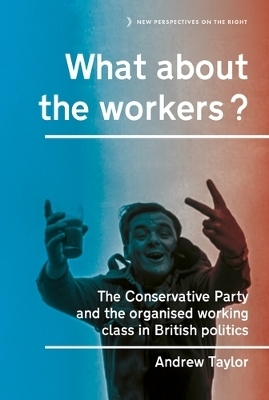
What About the Workers?
The Conservative Party and the Organised Working Class in British Politics
Seiten
2021
Manchester University Press (Verlag)
978-1-5261-0360-4 (ISBN)
Manchester University Press (Verlag)
978-1-5261-0360-4 (ISBN)
This book explores the long-term relationship between the Conservative Party, trade unions, and the organised working class. It focuses on the question of why the Conservative Party for much of its history sought to accommodate the unions and why in the 1970s and 1980s it adopted a policy of excluding the unions. -- .
The relationship between the Conservative Party and the organised working class is fundamental to the making of modern British politics. Industrialisation and urbanisation saw the emergence of democracy and class politics, symbolised, by the development of trade unions, which assumed growing political significance. The organised working class, though always a minority, was perceived by Conservatives as a challenge; condemned as threatening property, and as harbingers of socialism. Many trade union members dismissed the Conservatives as the bosses’ party, ever-ready to restrict the unions’ freedom in the interests of profit.
However, at the book’s core is a puzzle: why, throughout its history, was the Conservative Party seemingly accommodating towards the organised working class that it ideology, social composition, and the preferences of most Conservatives would seem to permit? And why, in the space of a relatively few years in the 1970s and 1980s, did it abandon this heritage? Taylor argues that throughout its history, the Conservative Party has faced a broad strategic choice with respect to the organised working class: either inclusion or exclusion.
The portrayal of the character on the front cover encapsulates the concept of the ‘bloody-minded’ British worker - an attitude that encapsulates a determinedly ‘conservative’ attitude to defending rights and influence
gained during the twentieth century and which led to the reaction against ‘union power’ in the 1960s and 70s. -- .
The relationship between the Conservative Party and the organised working class is fundamental to the making of modern British politics. Industrialisation and urbanisation saw the emergence of democracy and class politics, symbolised, by the development of trade unions, which assumed growing political significance. The organised working class, though always a minority, was perceived by Conservatives as a challenge; condemned as threatening property, and as harbingers of socialism. Many trade union members dismissed the Conservatives as the bosses’ party, ever-ready to restrict the unions’ freedom in the interests of profit.
However, at the book’s core is a puzzle: why, throughout its history, was the Conservative Party seemingly accommodating towards the organised working class that it ideology, social composition, and the preferences of most Conservatives would seem to permit? And why, in the space of a relatively few years in the 1970s and 1980s, did it abandon this heritage? Taylor argues that throughout its history, the Conservative Party has faced a broad strategic choice with respect to the organised working class: either inclusion or exclusion.
The portrayal of the character on the front cover encapsulates the concept of the ‘bloody-minded’ British worker - an attitude that encapsulates a determinedly ‘conservative’ attitude to defending rights and influence
gained during the twentieth century and which led to the reaction against ‘union power’ in the 1960s and 70s. -- .
Andrew Taylor is Emeritus Professor of Politics at the University of Sheffield -- .
Introduction
1 A strong taste for the despotism of numbers?
2 Peace and good will?
3 We shall get their help
4 War, conservatism and union power
5 Milk and water socialism?
6 The smack of firm government?
7 Confronting the British disease?
8 The enemy within
Conclusions
Bibliography
Index -- .
| Erscheinungsdatum | 10.05.2021 |
|---|---|
| Reihe/Serie | New Perspectives on the Right |
| Zusatzinfo | 5 tables |
| Verlagsort | Manchester |
| Sprache | englisch |
| Maße | 156 x 234 mm |
| Gewicht | 576 g |
| Themenwelt | Sozialwissenschaften ► Politik / Verwaltung ► Politische Systeme |
| Sozialwissenschaften ► Politik / Verwaltung ► Politische Theorie | |
| Sozialwissenschaften ► Soziologie ► Makrosoziologie | |
| ISBN-10 | 1-5261-0360-5 / 1526103605 |
| ISBN-13 | 978-1-5261-0360-4 / 9781526103604 |
| Zustand | Neuware |
| Haben Sie eine Frage zum Produkt? |
Mehr entdecken
aus dem Bereich
aus dem Bereich
Buch | Softcover (2023)
Phillip Reclam (Verlag)
7,00 €


